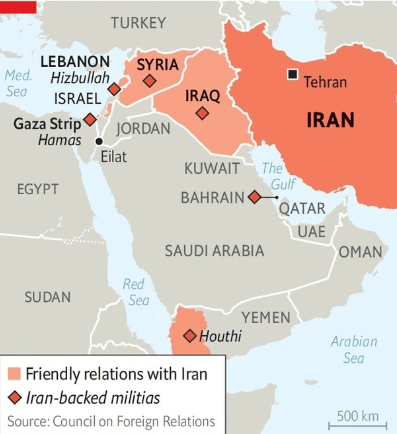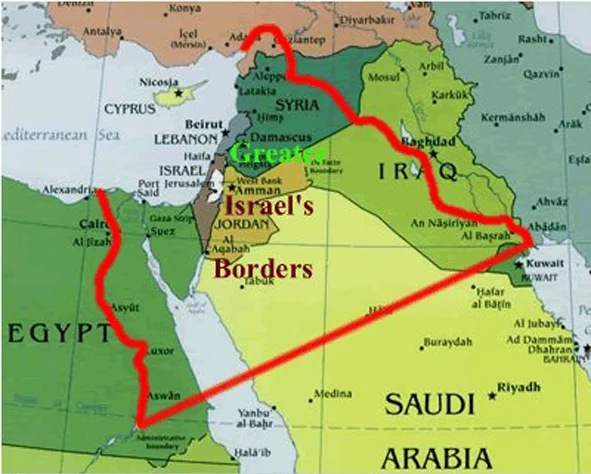A Psalm 83 Prophecy?
Psalm 83 tells us the Ishmaelites, Edom, Ammon, Amalek, Hagarenes, Tyre, Gebal and the Philistines wanting to attack Israel; for they have said, “Come, and let us cut them off from being a nation, that the name of Israel may be no more in remembrance.”
The most important question facing this Study is whether Psalm 83 is a prophecy of the past or is it one yet to come.
There are three possibilities: (1) of the Past, during David’s time; (2) of a “limited” prophecy, during the fall of the Ten tribes and carried away by the Assyrians; (3) of the future, still yet in the endtime future.
(1) If it was of the past that could had happened during the captivity of the northern Kingdom of Israel, when they were carried into captivity by the Assyrians. Psalm 83 fits perfectly with I Chronicles 18-19 where David’s army was in a major war with a large alliance that included Mesopotamians, Aramaeans, Ammonites and others.
The dominant power of Mesopotamia at that time was Assyria, or Asshur. All these nations are named in Psalm 83 as being in a war against David which wanted to wipe out the Israelites. Proponents further says there is no reference to (a) a latter day; (b) endtime or any time frame further into the future. Nothing in Psalm 83 identifies it as a latter day prophecy.
(2) Perhaps it might have being a “limited” prophecy: that is, it was a prophecy some two hundred years later when phases of the Ten Tribes were exiled, carried away by the Assyrians, the last, by Sennaherib, was in 721 BC. These Ten Tribes are the tribes of Reuben, Simeon, Dan, Naphtali, Gad, Asher, Issachar, Zebulun, Manasseh and Ephraim.
The scriptural basis for the idea of the Lost Tribes is II Kings 17:6: “In the ninth year of Hoshea, the king of Assyria took Samaria, and carried Israel away unto Assyria, and placed them in Halah, and in Habor, on the river of Gozan, and in the cities of the Medes.”
(3) If this is of the future, this may be another rise of a group of Israel enemies at the endtime. Some assert that it might have an unstated latter day application because some true latter-day prophecies mention the number “ten” (as in Daniel 2’s mention of ten toes and the “seven heads and ten horns” of Revelation 17).
They claim that the ancient warlike Assyrians migrated into Europe along with many other Semitic peoples when the Parthian Empire fell and ultimately became the warlike Prussians. Prussia ceased to exist after World War II but dispersed and scattered westward throughout Germany to escape the Russian armies that occupied the former lands occupied by Prussia.
A strong case in their favor is found in Isaiah 10:
5 “Woe to the Assyrian, the rod of Mine anger, and the staff in their hand is Mine indignation! 6 I will send him against a hypocritical nation, and against the people of My wrath will I give him a charge, to take the spoil and to take the prey, and to tread them down like the mire of the streets. 7 Yet he meaneth not so, neither doth his heart think so; but it is in his heart to destroy and cut off nations not a few. Isaiah 10:5-7
Psalm 83:1 Keep Thou not silence, O God; hold not Thy peace, and be not still, O God.
2 For lo, Thine enemies make a tumult, and they that hate Thee have lifted up the head.
3 They have taken crafty counsel against Thy people, and consulted against Thy hidden ones.
4 They have said, “Come, and let us cut them off from being a nation, that the name of Israel may be no more in remembrance.”
Today, a country like Iran (or its proxies: Hezbollah, Hamas, the Houties) would have said this, to drive the state of Israel into the sea; but “the head of the snake” Iran, or Persia or Elam by its ancient name, is conspiciously not listed among these nations wanting to to put an end to Israel.
Its absence speaks volumn! Nevertheless this could be a type that could re-emerge, in the form of “Gog and Magog” in Ezekiel 38-39 and again in Revelation 20:8.
5 For they have consulted together with one accord; they are confederate against Thee:
6 the tabernacles of Edom and the Ishmaelites, of Moab and the Hagarites, — the Moabites shouldn’t be distressed but when they pledged “Come, and let us cut them off from being a nation, that the name of Israel may be no more in remembrance,” they themselves lost the right to their name and land; see God’s earlier commitment till they lost it:
“And the Lord said unto me, ‘Distress not the Moabites, neither contend with them in battle; for I will not give thee of their land for a possession, because I have given Ar unto the children of Lot for a possession.’ Deuteronomy 2:8-9
And when we passed by from our brethren the children of Esau, who dwelt in Seir, through the way of the plain from Elath and from Eziongaber, we turned and passed by the way of the Wilderness of Moab;
— many obervers believe the brown Semites of Saudi Arabia spring from lshmael; and Hagar, the Egyptian handmaid of Abraham’s wife Sarai (as an interesting aside, Hagar means flight; the flight of Muhammed to Medina is known as the Hagira); they are descended from the Mizraimites (Genesis 16:1-4, 15).
— the Ishmaelites, the Moabites and the Hagarite remained where they were, but the posterity of Esau or the Edomites later moved to Spain (except, perhaps, some of the Amalekites, who could have remained there and intermarried with the local inhabitants, especially the Philistines, over the centuries to be known as the Palestianians we come to know today), and many then spread over to Mexico and South America where they are today; for more about the posterity of Esau or the Edomites, see more in Obadiah
7 Gebal and Ammon and Amalek, the Philistines with the inhabitants of Tyre. — the inhabitants of Tyre; this parallels the destruction of Damascus in Isaiah 17; as commented above, some of the Amalekites could have remained there and intermarried with the the Philistines, and over the centuries became known as the Palestianians today.
8 Assyria also has joined with them; they have helped the children of Lot. Selah — the Assyrians are listed among them, and therefore are not likely the Germans as some believe;
9 Do unto them as unto the Midianites, as to Sisera, as to Jabin at the Brook of Kishon,
— the ancient tribes and countries mentioned in Psalm 83 are:
— notice that these tribes and countries mentioned above are largely the land bound by “between the rivers” that is, within the bound of God’s given land allocated from God to Abraham and then to the full House of Jacob (Genesis 15); this could be considered as the Inner Ring (in contrast to “Gog and Magog” known as the Outer Ring);
of Edom and the Ishmaelites, of Moab and the Hagarites (verse 6); Gebal and Ammon and Amalek, the Philistines with the inhabitants of Tyre (verse 7); Assyria also has joined with them; they have helped the children of Lot (verse 8); the Midianites, as to Sisera, as to Jabin at the Brook of Kishon (verse 9); their nobles like Oreb and like Zeeb, yea, all their princes as Zebah and as Zalmunna (verse 11);
10 who perished at Endor; they became as dung for the earth.
11 Make their nobles like Oreb and like Zeeb, yea, all their princes as Zebah and as Zalmunna,
12 who said, “Let us take to ourselves the houses of God in possession.”

13 O my God, make them like a wheel, as the stubble before the wind.
14 As the fire burneth a wood, and as the flame setteth the mountains on fire,
15 so persecute them with Thy tempest, and make them afraid with Thy storm.
16 Fill their faces with shame, that they may seek Thy name, O Lord.
17 Let them be confounded and troubled for ever; yea, let them be put to shame and perish,
18 that men may know that Thou, whose name alone is Jehovah, art the Most High over all the earth.
Overall, a strong case could be for the “limited” prophecy. Foremost is that Iran “the head of the snake,” is not in the picture, which is inconceivable in today’s political environment; though many of its proxies (Hamas, Houthis, Hezbollah and other militias in Syria and Iraq) are there within the Inner Ring.
Second, no one could be cetain who the Assyrians are; some claim they are the Germans, but Germany hasn’t displayed any ambition to conquer Jerusalem; unless they change dramatically.
And finally, the book of Psalms, unlike Isaiah, Jeremiah, Ezekiel or Daniel, is not known to be a prophetic book for the endtime. Notwithstanding, this prophecy could be a type in the form of “Gog and Magog” to re-emerge again and again at the endtime.





